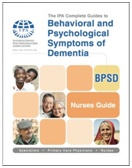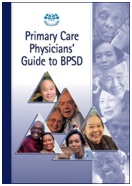IPA Complete Guides to Behavioral and Psychological Symptoms of Dementia (BPSD)
It is increasingly important that all professionals involved in the care and treatment of patients exhibiting signs of dementia have a thorough understanding of the Behavioral and Psychological Symptoms of Dementia (BPSD) and are provided with the best possible resources to guide them in developing effective courses of treatment.
It is for that need that the International Psychogeriatric Association (IPA) developed The IPA Complete Guides to BPSD which, although helpful to all geriatric healthcare providers, was prepared with a view toward the different perspectives of the many professions that encounter patients with BPSD.
To address your practice needs, The IPA Complete Guides to BPSD is designed to serve as a reference tool or as a training resource. When used for training, the individual guides of The IPA Complete Guides to BPSD series, as well as each module contained within The IPA Complete Guides to BPSD – Specialists Guide, can be used alone or together in a tailored approach to create your own customized program.
IPA Members have exclusive complete access to the comprehensive online collection of BPSD resources through the IPA members area.
The IPA Complete Guides to BPSD – Specialists Guide

The IPA Complete Guides to BPSD – Specialists Guide is a comprehensive compilation of eight modules detailing the presentation and causes of BPSD, constructive guidance on pharmacological and non-pharmacological treatment interventions, and information on caregiver education and support. This is the most extensive in the Guides series, and while helpful for all geriatric healthcare professionals, it is especially instructive for geriatric mental healthcare specialists: physicians, nurses, psychologists, occupational therapists, social workers and others.
The Modules:
- Module 1 – An introduction to BPSD
- Module 2 – Clinical issues
- Module 3 – Etiology
- Module 4 – Role of family caregivers
- Module 5 – Non-pharmacological treatments
- Module 6 – Pharmacological management
- Module 7 – Cross-cultural and transnational considerations
- Module 8 – Long-term care
Each module includes an in-depth discussion and analysis of its subject area and concludes with a reference and recommended reading list. The content of The IPA Complete Guides to BPSD – Specialists Guide is designed to contribute to the improved management of dementia patients with BPSD and reduce some of the stresses experienced by caregivers and families of dementia patients. (Revised 2015)
The IPA Complete Guides to BPSD – Nurses Guide

The IPA Complete Guides to BPSD – Nurses Guide is intended for use by nurses and other professionals involved in nursing care to aid in the study and management of patients with BPSD, and is not for use by patients and their caregivers. The Nurses Guide focuses on the unique aspects involved in nursing, including care approaches and nursing interventions specific to BPSD, and the need to provide support to formal and informal caregivers. This guide should be seen as a complement to The IPA Complete Guides to BPSD – Specialists Guide, a more in-depth resource with its many different modules intended for all those healthcare professionals who have specialized in geriatric mental healthcare. (Revised 2012)
The Primary Care Physicians’ Guide to BPSD

The Primary Care Physicians’ Guide to BPSD was written for primary care physicians, as many times they are the first point of contact for patients and their caregivers. In that role, it is vital that physicians and their staff are familiar with clinical manifestations and management of BPSD. This Guide is a valuable resource for the identification and early diagnosis of dementia that is so critical for patients and their caregivers. (2003 – currently in revision)







